 1
1

Great pyramid in Cholla
 17. 04. 2024
17. 04. 2024



 1
1

 17. 04. 2024
17. 04. 2024
 6
6

 16. 04. 2024
16. 04. 2024
 8
8

 15. 04. 2024
15. 04. 2024
 1
1

 28. 01. 2021
28. 01. 2021

Anunna, also known as the Anunnaki, are central characters in the narrative of the ancient cosmic visitors who landed on our planet, created humanity, gave it civilization, and left traces in the legends of many nations. It is the Sumerian and Babylonian texts teeming with countless gods, monsters, and demigod heroes that gave the world the name of these ancient astronauts.
The gods of these myths occupied prominent positions in the cult of ancient civilizations, sacrificed and composed lengths of hymns and mythological texts celebrating their deeds. But who were they really, and what is written about them on ancient Sumerian clay tablets?
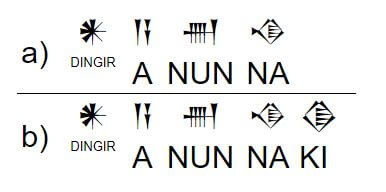
The hidden meaning of the word Anunna
There was a long time ago when ancient cuneiform texts were hidden in museum depositories and hardly accessible literature. Today, in the era of the Internet and thanks to the efforts of many researchers, we have the opportunity to look into these texts from the comfort of home and read the forgotten knowledge that ancient civilizations have left us. In particular, we can use three websites: Corpus of Sumerian Literature (ETCSL) created by Oxford University, where major literary works written in Sumerian are published, Cuneiform Digital Library Initiative (CDLI), a collaborative project developed by several universities to collect photographs and transcripts of the original clay tables in Sumerian and Akkadian, the Babylonian and Assyrian languages, and The Pennsylvania Sumerian Dictionary, including, but not limited to, transcripts of individual words in a cuneiform. Armed with these powerful tools, we can follow in the footsteps of Anunna, mysterious stars.
But if we want to find real information about the Anunna beings in the Sumerian texts, we should first consider how this expression was written by ancient scribes. This will also help us discover the hidden meaning of the term and the nature of the beings that it has been called.
First of all, it should be noted that the Sumerians used a sign for their gods - AN (in this case read dingir), which has the form of an eight-pointed star. At the same time, however, this sign meant "heaven" (read an) and also the name of the god of heaven (also An), the ruler of other gods, who appears only exceptionally in myths, but he is usually shown the highest respect. Given the combination of the term dingir with the term for heaven, perhaps it would be more appropriate to call these beings "heavenly beings" instead of the gods.
Knowledge of this term and understanding of its meaning is very important, because the symbol of dingir appears before the name of every god, lower protective deities, demons, but also deified rulers such as Gilgamesh, Naram-Sin or Shulgi. This sign serves as a so-called determinative that is not read, but informs the reader that the following word is an expression for a divine being. Because it is not read, experts write it in Latin transcripts as a superscript. And it is this sign that appears before the designation of the "great gods" Anunna.
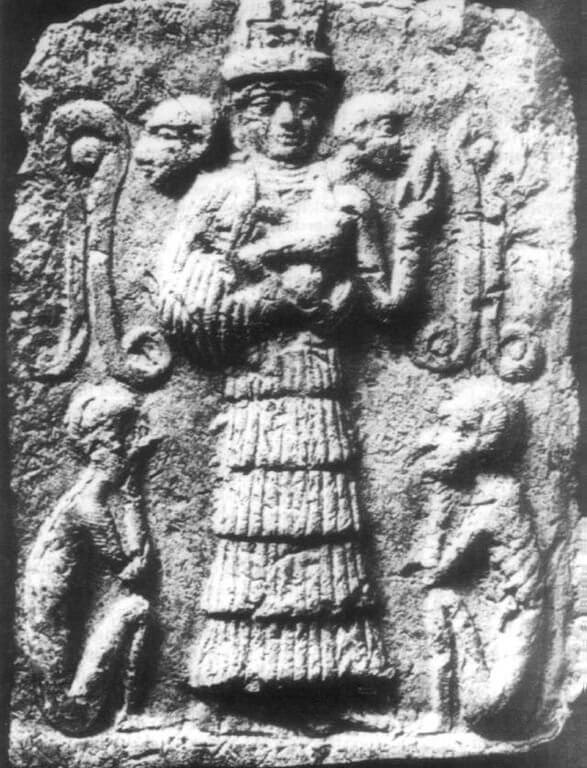
Goddess Ninchursag - the creator of the people
The word Anunna is written using the following cuneiform characters: dingir A-NUN-NA (Fig. 1 a). The first sign is already known to us and indicates celestial beings. Another sign of the Sumerians was the word water, but it also meant sperm or ancestry. The meaning of the following character, NUN, is a prince or prince. Remarkably, the name of the city of Eridu (NUN ki) was written with the same character and Enki was also referred to in myths. The last character is a grammatical element. Thus, the term anunna can be translated as “heavenly beings of princely origin (seed)”, and indeed the scribes of ancient texts are also perceived in this way, since the most common nicknames associated with Anunna are “great gods.” are for example the protective deities of lamma, or the demons of udug.
Now you might say, "But wait, doesn't the Anunnaki happen to mean 'those who came from heaven,' as Sitchin states?" The truth is that the term Anunnaki (written; dingir A-NUN-NA-KI - Fig. 1 b) it appears for the first time in Akkadian texts belonging to the Babylonians and Assyrians; until then, only the term Anunna was used, and the symbol KI, meaning 'land', was added later. It is uncertain why this was done, but it seems necessary at the time to distinguish between the Anunna beings who remained on Earth (Anunnaki) and those who returned to space, perhaps referred to as Igigi, as the Akkadian epic Enum Elisha suggests. It states that Marduk sent 300 Anunnaki to heaven and 300 remained on earth, and that three hundred Igigi inhabited heaven.
However, interpreting the term Anunna or Anunnaki as "those who came from heaven on earth" is not as nonsense as opponents of theories about ancient astronauts would like. The text of the Sumerian song The Dispute of the Sheep with the Grain begins with the words: "When, on the hill of heaven and earth, An begot the gods Anunna,…" this introductory sentence can be understood as initially Anunna coming from somewhere (ANKI translated as heaven and earth - AN KI) and were descendants of the god Ana, hence the heavens. The celestial origin of Anunna is also confirmed by the text of Lamentation of Arura or Lamentation to Enki, in which it is stated that Anunna in heaven, and later on earth, was begotten by the god An. Thus, these compositions clearly refer to the cosmic or celestial origin of the Anunna beings.
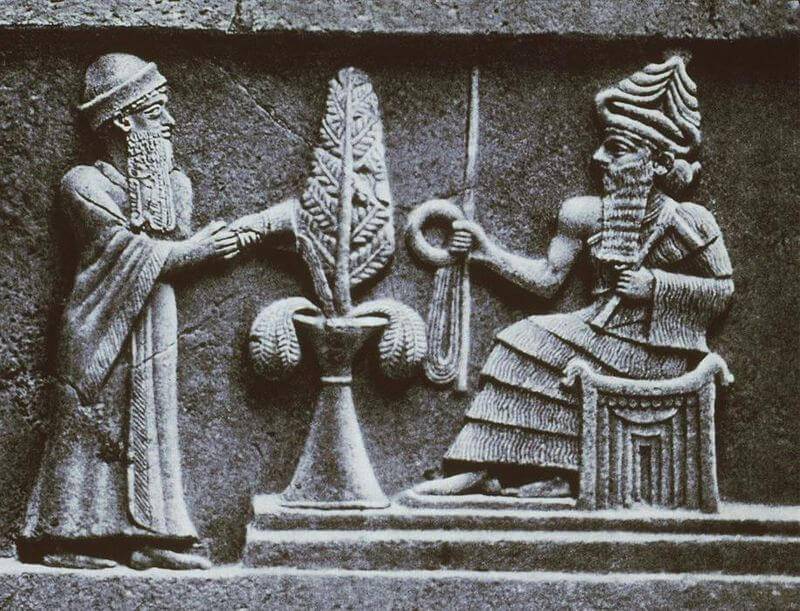
Detail from Ur-Namm stele. Ur-Namma gives concessions to the seated god
Despite the clarification of the true meaning of the term Anunna, the question still remains, who really were the beings that the Sumerians so called? A detailed study of Sumerian myths, hymns and compositions proves that it was indeed a collective designation of the gods, because the word Anunna is often followed by the designation "gal dingir", ie the great gods. The texts do not usually describe their specific form, with the exception of the individual gods. In the descriptions of individual deities, we often learn that they were surrounded by a "terrifying glow," Sumerian called "melam."
Some songs also speak of a menacing look, such as the hymn of Inanna's promotion or Inanna's descent into the underworld. As for the depiction of the Sumerian gods, and thus Anunna as such, they are often depicted as human figures usually sitting on a throne and receiving a petitioner (so-called divine audience) or in various mythological scenes. However, they are distinguished from people by a horned cap or helmet.
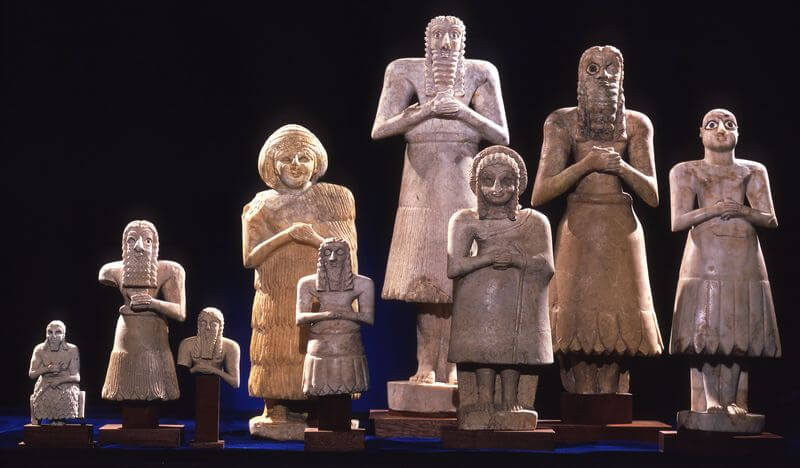
Anunna - beings from stars in Sumerian texts
The beings with a seven-horned cap were undoubtedly among the highest. With such a head covering, Enki, Enlil, Inanna, and other "great gods" are depicted. Some gods are depicted with a two-horned cap, and it is possible that they are "lower gods," the protective beings of the lamma. These usually lead the petitioner to the deity in the engravings. However, statues from the locality of el-Obejd (or also Ubaid), whose faces bear reptile features - especially the shape of the head and eyes - are also associated with Anunna. The extent to which these connections are justified is debated, but Anton Parks, for example, states in The Secret of Dark Star that, according to his channeled information, Anunna's creatures were reptilian.
The fact that Anunna were creatures "of flesh and blood," and not just some product of imagination or personification of the forces of nature, is evidenced by the numerous references to the need for food. This was also one of the reasons why man was created - to provide for the gods. This is best illustrated by the Akkadian myth of Atrachasis, in which the gods suffer from hunger after the flood, and when Atrachasís offers them a sacrifice of roast meat, they fly on it like flies. The need for sustenance is also confirmed by the myth of Enki and the arrangement of the world, according to which Anunna dwell among men and eat their food in their shrines.
In this myth, Enki also built them dwellings in cities, divided land and gave them powers. And just one of their favorite pastimes was feasting and drinking beer or other alcohol, which from time to time did not end very happily, as emphasized by Enki and Ninmach, in which drunken gods set out to create handicapped people after initial success with human creation, and Inanna and Enki, where in drunkenness Enki generously handed over to Inanna all his divine powers ME, some kind of programs or plans for the organization of the world, which he then bitterly regretted after sobering up.
In the Sumerian texts, the term Anunna is most commonly used as a collective designation, as we would say "people." Certain gods are called "Anunnak brothers" or "one of Anunna," which supports this interpretation. Quite often this term is also used to emphasize the power, strength and magnificence of a particular God. For example, the text of the promotion of Inanna states:
“Dearest mistress, beloved by Anem,
Thy holy heart is great;
Beloved woman Ushgal-ana,
You are the lady of the heavenly horizon and the headquarters,
Anunna submitted to you,
You were a young queen since birth,
How are you elevated above all Anunna, great gods today!
Anunna kisses the ground with your lips in front of you ‟
Similarly, it is said of various gods or beings, how majestic they are, and how Anunna crouches before them and pays them tribute. Although there is no clearly defined hierarchy among Anunna, it is clear that some of them were simply more powerful and influential.
But who were the more powerful and influential gods that chant the Sumerian hymns? The highest of the gods is considered An, who always acts more like the father and creator of Anunna than their ruler. He could be said to be the so-called sleeping god, distant from the ordinary hardships of people and the muddle of other gods. Although he does not actively interfere with what is happening on Earth, he decides on fates and presides over the assembly of gods. It always occupies the most honorable place - for example, at a feast that Enki holds in Nippur to celebrate the completion of its E-Engura headquarters, it is seated in an honorable place.
Enki himself is often called "master" or "leader" Anunna in the lyrics. As mentioned above, both the Enki and the city of Eridu (NUN ki) were used as NUN, which is far from coincidence. The word NUN, which means "noble" or "prince", seems to be directly synonymous with Enki. 50 Anunna of Erid, mentioned in the spell of Ur III, 21, is associated with Erida, and thus Enki. century BC, which Sitchin interprets as the first colonizers of Earth accompanying their leader Enki. To him, they also duly show respect for the proclamation of his glory, as in Enki and the organization of the world:
"The gods of Anunna speak kindly to the great prince who traveled his country:
'To the Lord riding on the big, pure ME,
He controls a large, myriad of MEs,
To whom he is not equal throughout the vast universe,
But in the glorious, noble Erid he received the highest Europeans
Enki, Lord of Heaven and Earth (the universe) - be praise! '
Chanting and proclaiming fame is a frequent activity of Anunna in Sumerian texts, as well as offering prayers. They are also often asked to pray for the supplicant.
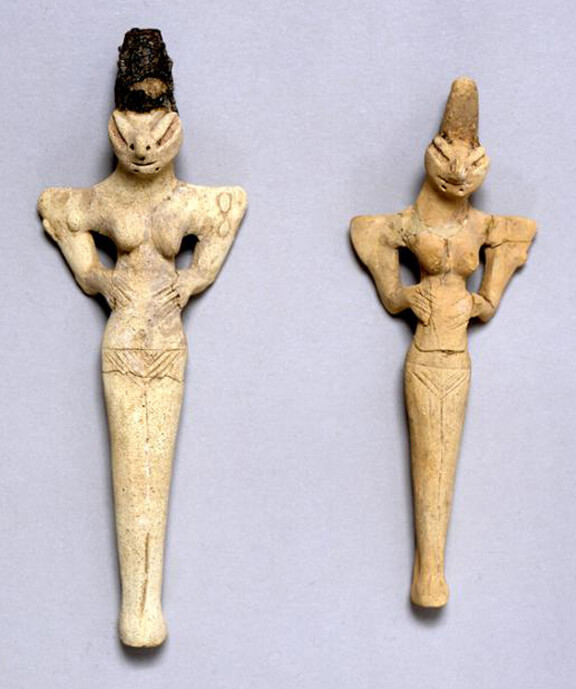
Figures with reptilian features found on the el-Obejd site
Another giant among Anunna is Enlil, who, within the traditional religion of the Sumerians, assumed the post of the most powerful god. He represented a God exercising power; an active element that decides the fate of people and other gods. He is also often a god of destruction. At his command, the city of Akkad was destroyed because King Naram-Sin had disgraced his sanctuary at Nippur and it was he who ordered the flood of the world according to the Akkadian myth of Atrachasis because mankind had overgrown and was too noisy. In Sumerian writings he is called the most powerful, foremost and even god of all Anunna. The other gods came to Enlil's E-kur mansion for regular celebrations and extraordinary meetings, and this "Journey to Nippur" was a frequent theme of the celebrated poems.
Anunna includes the divine hero and warrior Ninurta, who is said to be the strongest of them. He was a relentless warrior who had often helped solve difficult situations that disrupt the order of the world, such as when the Anzu bird had stolen fate tables or when the world was threatened by the Asag monster. The list of all significant Anunna would be too long, for some texts state that there were as many as 600. Of these, 600 were 50 great gods and 7 destiny determinants. Who, however, belongs to these selected 50 and 7 is difficult to say exactly.
Determining destinies and judging seems to have been Anunna's most important activity. For the Sumerians, the word destiny, namtar, literally meant measuring life expectancy. Measuring this length was one of the activities determined by Anunna, just as Moira measured fate in Greek myths. The main deities were responsible for determining destiny, forming a council of gods, headed by four or seven deities, the most important of whom were An, Enlil, Enki, and Ninchursag. An and Enlil played a decisive role, with An, in keeping with his position, representing only a kind of guarantor without any direct executive power.
This was provided exclusively by Enlil, who is repeatedly mentioned in the texts as donors of destiny. However, according to even older, perhaps even prehistoric, traditions, it seems that it was Enki who determined destiny, and cuneiform tables called him "the master of destiny until the second millennium BC." Enki and Ninchursag's compositions also prove Enki's role in determining destiny. in which he determined the fates of the plants and the text of Enki and the arrangement of the world in which he assigns roles, in other words, he measures fates, by Anunna himself. Enki also originally owned the Tables of Destiny and the divine laws of the EC.
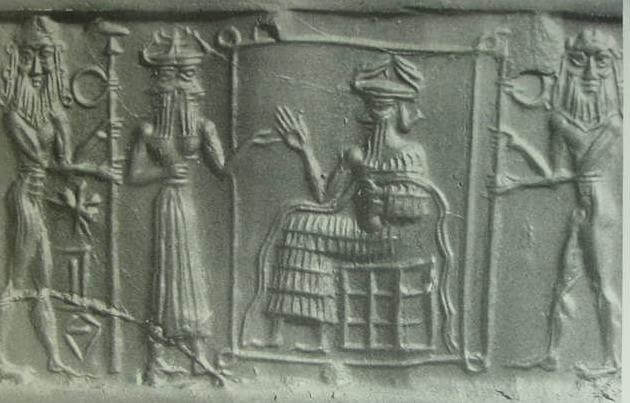
Enki, sitting in His abode, accompanied by Chamberlain Isimud and the beings of Lachm.
In addition to determining fates, Anunna also plays the role of judges, most notably in the myths associated with the 'underworld' or KUR country. It is ruled by the goddess Ereskigal, along with seven Anunna who make up her body of judges. However, the activities of these judges and their competences are not clear, and it seems from the surviving texts that the quality of life after death was not based on morality and commandment, but on whether the deceased had enough descendants to provide him with eternal food and drink sacrifices. In this concept, the posthumous court seems unnecessary. However, it is likely that one of the functions of the Kur judges was to supervise compliance with local laws, as evidenced by the famous poem about Inanna's descent into the underworld. When Inanna tried to overthrow her sister Ereskigal from the throne, seven judges intervened hard against her:
“That seven Anunna, the judges, sentenced her.
They looked at her with deadly eyes,
they called her a paralyzing word,
they scolded her in a reproachful voice.
And Inanna turned into a sick woman, a beaten body,
and the beaten body was nailed. ‟
Gilgamesh, who was accepted to Anunna because of his heroic deeds and demigods, joined the underworld judges after his death. His task in eternity was to judge the deeds of kings. At his side stood the ruler Ur-Namma, who, under the command of the Queen of the Underworld, Erekshigal, ruled over those killed or guilty of something.
The spiritual concept of Anunna as the determinants of the fates and judges of the dead seems to exceed the potential of physical beings. However, it is possible that Anunna possessed extra-sensory abilities such as clairvoyance, dimensional overcoming, and a direct connection to Akasha, which can be identified with the aforementioned "fate tables." programs that allowed them to gain more control over their creations, either through the abovementioned capabilities or using advanced technology. This would give them power over what people perceived as fate - an unchanging, predetermined destiny against which one cannot resist and which must be followed. There is no doubt that the beings who created humanity as their servants could have used such a tool to obtain the status of "deity" in the eyes of ordinary people.
In ancient Mesopotamia, there was the idea of the original hill as the place of creation of the world. It was this hill that first emerged from the endless waters of the cosmic ocean and thus represented the initial fixed point in the universe where formation could take place. The Sumerian composition The Spore of the Sheep with the Grain states that such a cosmic hill was the birthplace of Anunna, and is also associated with the goddess Ninchursag, the mother and creator of gods and men. Likewise, the poem Gilgamesh's Death, in the list of the various gods who received gifts from Gilgamesh after his death, relates Anunna to a sacred hill called Sumera's "Duku."
It was also a place where ancient texts state that destinies were determined here, which was one of Anunna's characteristic activities. The importance of the sacred hill of Duke is underlined by the fact that each Sumerian temple, originally the seat of the deity, represented a miniature of this original hill, creating an axis of the world directly connected to the realm of the gods and the time of creation and primordial world order.

A scene depicting a feast from the so-called Ur standards
The question is whether it is possible to connect the sacred mound of Duke with Mount Hermon in Lebanon, where the fallen angels, guardians, landed according to Enoch's book. In an interview with Gaia.com's Disclosure show, Andrew Collins notes that Duku is a monumental prehistoric Göbekli Tepe temple in southeastern Turkey. This connection has already been suggested by Kalus Schmidt, an archaeologist who has explored this unusual monument. Remarkably, a location where agriculture first appeared was not far from the Göbekli Tepe site.
As already mentioned, seven Anunna inhabited the land of Kur, where they were judges. Kur, as the name of this place, which means mountain, suggests, was apparently located in the Zagros Mountains in western Iran, or in the north in the mountains of south-eastern Turkey. This place is ruled by Queen Ereskigal, the sister of Inanna, and is inhabited by a host of demons and beings. Traditionally, it is considered the "underworld" or the world of the dead, a landscape from which there is no return. This rule also applied to the gods, and even Ereskigal herself could not leave this place. Certain beings could, however, come in and out without limitations, such as the Eraschigalin Chamberlain Namtar, or various demons and asexual beings.
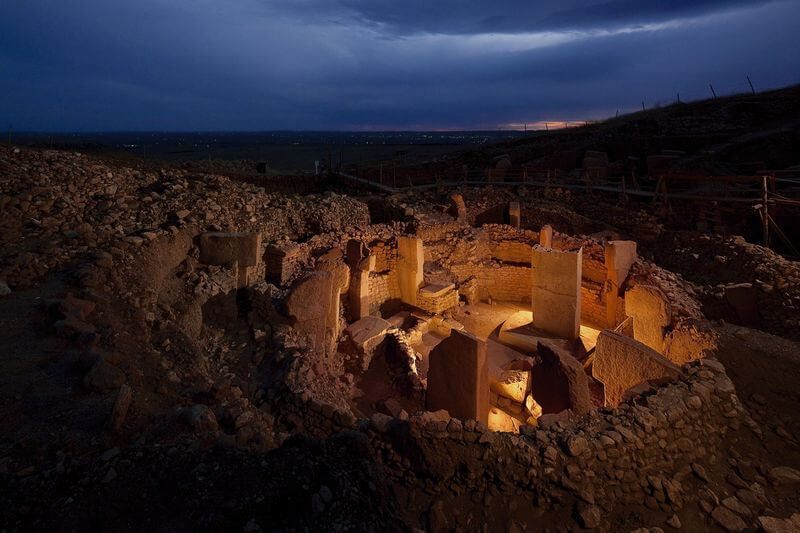
Göbekli Tepe in southeastern Turkey
Another Anunna site listed on the Sumerian tables are temples. In the anthem of Kesh Temple it is written that he was the home of Anunna. This remarkable residence of the goddess Ninchursag, which the text says descended from heaven, was the place where kings and heroes were born and where deer and other animals were chasing. Perhaps it was a mother ship in which were placed biological and cloning laboratories and where the first man was created. Last but not least, the towns of Anunna are the Sumerian towns themselves. Again, 50 Anunna from Erid is mentioned, but the tables also mention Anunna from Lagash and Nippur. Nippur as the seat of Anunna occupies a privileged position, for it was also the seat of Enlila, the foremost in the Sumerian pantheon, and the place where fate was determined and decided.
The story of Edith Eva Eger, who experienced horrific period of concentration camps. Against their background shows us all we have a choice - to decide to step out of the role of victim, to break free from the shackles of the past and to start living fully. WE RECOMMEND!
User rating of 1.12.2020: The book is a powerful reading experience.